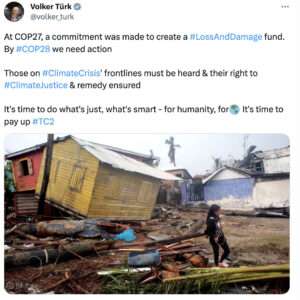Catastrophic climate impacts are hitting all over the world, and the human rights of those who are most marginalized are the worst impacted. Communities and groups in vulnerable situations are being disproportionately ravaged by wildfires, cyclones, and floods. They are paying the price of the continued expansion of the production and use of fossil fuels, further exacerbating the climate crisis. The decision to establish a Loss and Damage Fund under the UN Climate Convention to address these losses and damages is fundamentally about remedying these human rights harms.
Since March, States have been meeting regularly as part of a Transitional Committee on loss and damage to come up with a set of recommendations, among other things, on how the new fund should operate. As the UN High Commissioner for Human Rights, Volker Türk reminded Transitional Committee members at the time of their second meeting, States have a legal responsibility to listen to the voices of frontline and fenceline communities and respect their right to remedy as they develop recommendations on the operationalization of the Fund.
Just three months ahead of the next Climate Summit (COP28), the Transitional Committee meets for a 3rd time this week in Santo Domingo, Dominican Republic. It’s time to make concrete progress. Previous meetings have focused primarily on gathering input and while the Transitional Committee started going into more detail as it moved from the first to the second meeting, until now, it is unclear what direction States are taking to find consensus and provide ambitious recommendations to actually set up a Fund that meets the needs and priorities of those most impacted, including by ensuring it is resourced at scale.
This fund, even more than any other, must be about delivering justice to communities and protecting their rights. The second Glasgow Dialogue, which happened in Bonn in June and is informing this week’s negotiations, indicated a strong interest from multiple States to root the Loss and Damage Fund in human rights. It was mentioned explicitly by some – including how the Fund should promote the recently universally recognized right to a clean, healthy, and sustainable environment – and many principles and approaches that are core to a human rights-based approach were discussed. These include taking into account the voices of affected groups.
We have all the reasons to be worried that this will not happen, as the Transitional Committee has yet to show an understanding of how to ensure meaningful and effective participation of civil society and Indigenous Peoples in the process, as evidenced by the fact that this week’s meeting is largely closed to civil society and affected groups and the flawed accreditation process has obstructed duly nominated participants from the region from joining. This has proven to be a structural issue, as evidenced by less severe but similar restrictions during the previous two meetings. This cannot be the case for the Fund itself as meaningful participation is key at every stage of the negotiations, design, and implementation to make sure the Fund delivers, and the Transitional Committee can and must do better.
As the Transitional Committee moves into a crucial stage of the process, where progress towards the actual development of the recommendations is expected, the following key elements relating to the guiding principles, objectives, governance, operational modalities, and transparent and accountability mechanisms of the Fund will be crucial, to ensure that the Fund meets the needs and priorities of affected communities and respects their rights:
- Embedding human rights guiding principles,
- Realizing meaningful and effective public participation,
- Fulfilling the right to remedy,
- Building on inclusive and human rights-based needs assessments,
- Reaching those in the most vulnerable situations and ensuring non-discrimination and substantive equality,
- Realizing direct access to resources for affected communities,
- Putting in place strong environmental, social, and human rights safeguards and accountability mechanisms,
- Providing non-debt-creating instruments.
The Transitional Committee’s recommendations must establish a Governing Instrument for the Loss and Damage Fund that not only explicitly includes these elements but also tasks the Board of the new Fund with further development of related mechanisms and policies through inclusive and participatory processes involving affected communities. A lot can be learned from good practices in other funds and existing standards, such as the Green Climate Fund’s Indigenous Peoples’ Policy, existing guidelines for inclusion of persons with disabilities in humanitarian action, and the UN Reparations and Remedy Framework. The relevance of the latter has, once more, been confirmed in the recently published authoritative statement of the UN Committee on the Rights of the Child on children’s rights and the environment which “encourages States to take note that, from a human rights perspective, loss and damage are closely related to the right to remedy and the principle of reparations” (General Comment n°26).
While the Transitional Committee dives into the bigger political questions of where the Fund will be housed and how it will be funded, it must not lose sight of its task at hand: delivering justice to and fulfilling the human rights of those who have been harmed as a result of the fossil-fueled climate crisis. It should not shy away from new approaches and seek guidance from relevant experts outside the Climate Convention, including UN Human Rights institutions. A failure to deliver will not make the communities whose rights are at stake and who are entitled to remedy go away to the contrary.
This article by CIEL Senior Campaigner Lien Vandamme was also published on the Loss and Damage Coalition’s website.
Published on August 30th, 2023

